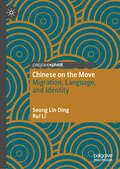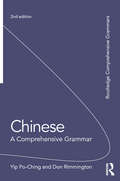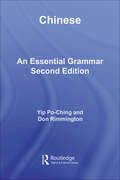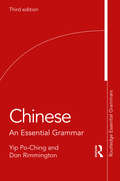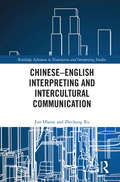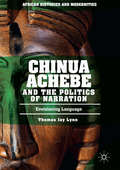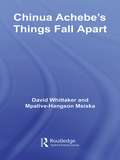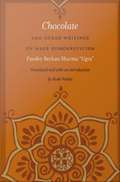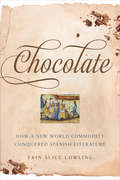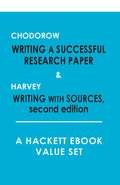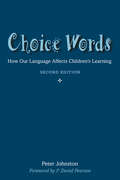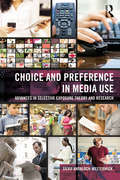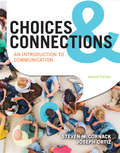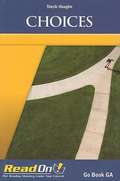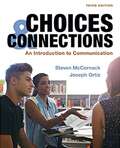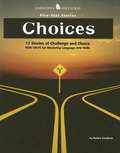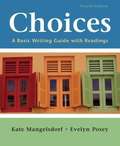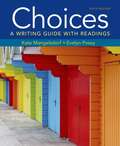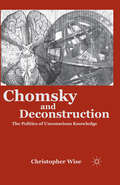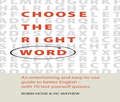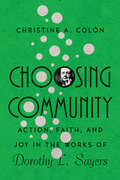- Table View
- List View
Chinese on the Move: Migration, Language, and Identity
by Rui Li Seong Lin DingThis book is the first to study the language and politics of identity of recent mainland Chinese migrants to Malaysia. Drawing on a variety of fieldwork data, the volume provides an accessible and succinct view of this &‘new&’ transnational migrant community in multilingual Malaysia. Unlike earlier Chinese migrants (the &‘old&’ Chinese communities) who migrated to Malaysia (previously British Malaya) due to experiencing poverty in China, the &‘new&’ Chinese community in Malaysia comprises mainly students, professionals, migrants who participated in the Malaysia My Second Home (MM2H) programme and individuals who married locals. This book focuses on the experiences of these new migrants from mainland China, how they were received in Malaysian society, the language problems and barriers they faced, their language accommodation and potential linguistic dislocation, their attitudes and identities, whether these shifted over time, and the (in)visibility and social inclusion of these migrants in Malaysian society. It also offers insights and understanding of the dynamic and complex nature of how migrants are inclined towards their &‘home&’ country while adapting to their &‘host&’ society. This book enriches the literature on language use and adaptation in Chinese diaspora communities throughout the world, as well as the politics of language and identity, and it will be of interest to students and scholars of Sociolinguistics, Chinese studies, Asian studies, Migration studies, and Southeast Asian studies.
Chinese: A Comprehensive Grammar
by Yip Po-Ching Don RimmingtonChinese: A Comprehensive Grammar is a complete reference guide to Chinese grammar which presents a fresh and accessible description of the language, concentrating on the real patterns of use in modern Chinese. The volume is organized to promote a thorough understanding of Chinese grammar. It offers a stimulating analysis of the complexities of the language and provides full and clear explanations. Throughout, the emphasis is on Chinese as used by present-day native speakers. An extensive index and numbered paragraphs provide readers with easy access to the information they require. The new edition features a revised and expanded chapter on prosody (Prosody and Syntax), as well as four completely new chapters: • Morphology and Syntax (I) looks at Chinese word formation • Morphology and Syntax (II) explores the interaction between words, expressions and sentences • Intralingual Transpositions reviews the possible conversions between sentential constructions • Interlingual Conversions examines the differences between Chinese and English. The Grammar is an essential reference source for the adult learner and user of Chinese. It is ideal for independent study and for use in schools, colleges, universities and adult classes, up to an advanced level.
Chinese: An Essential Grammar (Routledge Essential Grammars)
by Don Rimmington Po-Ching YipThis new edition of Chinese: An Essential Grammar is an up-to-date and concise reference guide to modern Chinese (Mandarin) grammar. Refreshingly jargon free, it presents an accessible description of the language, focusing on the real patterns of use today. This Grammar aims to serve as a reference source for the learner and user of Chinese, irrespective of level, setting out the complexities of the language in short, readable sections. Features include: A new chapter on paragraph development Chinese characters, as well as the pinyin romanization, alongside all examples Literal and colloquial translations in English to illustrate language points detailed contents list and index for easy access to information A glossary of grammatical terms It is ideal either for independent study or for students in schools, colleges, universities and adult classes of all types.
Chinese: An Essential Grammar (Routledge Essential Grammars)
by Yip Po-Ching Don RimmingtonThis new and extended edition of Chinese: An Essential Grammar is an up-to-date and concise reference guide to modern Chinese (Mandarin) grammar. Refreshingly jargon-free, it presents an accessible description of the language, focusing on the real patterns of use today. This Grammar aims to serve as a reference source for the learner and user of Chinese, irrespective of level, setting out the complexities of the language in short, readable sections. It is ideal either for independent study or for students in schools, colleges, universities and adult classes of all types. Features include: Three new chapters on speech habits, writing conventions and new lexicalisation processes Chinese characters, as well as the pinyin romanisation, alongside all examples Literal and colloquial translations into English to illustrate language points Detailed contents list and index for easy access to information A glossary of grammatical terms.
Chinese–English Interpreting and Intercultural Communication: Concepts And Perspectives (Routledge Advances in Translation and Interpreting Studies)
by Zhichang Xu Jim HlavacChinese and English are the world’s largest languages, and the number of interpreter-mediated interactions involving Chinese and English speakers has increased exponentially over the last 30 years. This book presents and describes examples of Chinese–English interpreting across a large number of settings: conference interpreting; diplomatic interpreting; media interpreting; business interpreting; police, legal and court interpreting; and healthcare interpreting. Interpreters working in these fields face not only the challenge of providing optimal inter-lingual transfer, but also need to fully understand the discourse-pragmatic conventions of both Chinese and English speakers. This innovative book provides an overview of established and contemporary frameworks of intercultural communication and applies these to a large sample of Chinese–English interpreted interactions. The authors introduce the Inter-Culturality Framework as a descriptive tool to identify and describe the strategies and footings that interpreters adopt. This book contains findings from detailed data with Chinese-English interpreters as experts not only in inter-lingual exchange, but cross-linguistic and intercultural communication. As such, it is a detailed and authoritative guide for trainees as well as practising Chinese–English interpreters.
Chinua Achebe and the Politics of Narration: Envisioning Language (African Histories And Modernities)
by Thomas Jay LynnThis book examines vital intersections of narration, linguistic innovation, and political insight that distinguish Chinua Achebe's fiction as well as his non-fiction commentaries. Each chapter focuses on a different aspect of these intersections: Achebe's narrative response to Western authors who have written on Africa, his integration of Igbo folklore, the political implications of writing African literature in English, his use of Nigerian Pidgin, and the Nigerian Civil War. It also addresses the teaching of Achebe's works. Achebe drew on diverse resources to offer searching psychological and political insights that contribute not only a decidedly African political viewpoint to the modern novel, but also a more inclusive narrative consciousness. Achebe's adaptations of Igbo oral art are intrinsic to his writing's political engagement because they assert the integrity and authority of the African voice in a global order defined by colonialism. This book reveals how his work has helped to restructure a global vision of Africa.
Chinua Achebe's Things Fall Apart: A Routledge Study Guide (Routledge Guides to Literature #137)
by David Whittaker Mpalive-Hangson MsiskaOffering an insight into African culture that had not been portrayed before, Things Fall Apart is both a tragic and moving story of an individual set in the wider context of the coming of colonialism, as well as a powerful and complex political statement of cross-cultural encounters. This guide to Chinua Achebe’s compelling novel offers: an accessible introduction to the text and contexts of Things Fall Apart a critical history, surveying the many interpretations of the text from publication to the present a selection of critical writing on Things Fall Apart, by Abiola Irele, Abdul JanMohamed, Biodun Jeyifo, Florence Stratton and Ato Quayson, providing a variety of perspectives on the novel and extending the coverage of key critical approaches identified in the survey section cross-references between sections of the guide, in order to suggest links between texts, contexts and criticism suggestions for further reading. Part of the Routledge Guides to Literature series, this volume is essential reading for all those beginning detailed study of Things Fall Apart and seeking not only a guide to the novel, but a way through the wealth of contextual and critical material that surrounds Achebe’s text.
Chocolate: And Other Writings On Male Homoeroticism
by Ruth VanitaThis volume makes available for the first time in English the work of a significant Indian nationalist author, Pandey Bechan Sharma, better known in India as "Ugra," meaning "extreme. " His book Chocolate, a 1927 collection of eight stories, was the first work of Hindi fiction to focus on male same-sex relations, and its publication sparked India's first public debates about homosexuality. Many prominent figures, including Gandhi, weighed in on the debates, which lasted into the 1950s. This edition, translated and with an introduction by Ruth Vanita, includes the full text of Chocolate along with an excerpt from Ugra's novel Letters of Some Beautiful Ones (also published in 1927). In her introduction, Vanita situates Ugra and his writings in relation to Indian nationalist struggles and Hindi literary movements and feuds, and she analyzes the controversies that surrounded Chocolate. Those outraged by its titillating portrayal of homosexuality labeled the collection obscene. On the other side, although no one explicitly defended homosexuality in public, some justified Ugra's work by arguing that it was the artist's job to educate through provocation. The stories depict male homoeroticism in quotidian situations: a man brings a lover to his disapproving friend's house; a good-looking young man becomes the object of desire at his school. The love never ends well, but the depictions are not always unsympathetic. Although Ugra claimed that the stories were aimed at suppressing homosexuality by exposing it, Vanita highlights the ambivalence of his characterizations. Cosmopolitan, educated, and hedonistic, the Hindu and Muslim men he portrayed quote Hindi and Urdu poetry to express their love, and they justify same-sex desire by drawing on literature, philosophy, and world history. Vanita's introduction includes anecdotal evidence that Chocolate was enthusiastically received by India's homosexual communities.
Chocolate: How a New World Commodity Conquered Spanish Literature (Toronto Iberic)
by Erin CowlingIn terms of its popularity, as well as its production, chocolate was among the first foods to travel from the New World to Spain. Chocolate: How a New World Commodity Conquered Spanish Literature considers chocolate as an object of collective memory used to bridge the transatlantic gap through Spanish literary works of the early modern period, tracing the mention of chocolate from indigenous legends and early chronicles of the conquistadors to the theatre and literature of Spain. The book considers a variety of perspectives and material cultures, such as the pre-Colombian conception of chocolate, the commercial enterprise surrounding chocolate, and the darker side of chocolate’s connections to witchcraft and sex. Encapsulating both historical and literary interests, Chocolate will appeal to anyone interested in the global history of chocolate.
Chodorow: A Hackett Value Set
by Gordon Harvey Stanley ChodorowNow available together as a set for a discounted price: Writing A Successful Research Paper: A Simple Approach, by Stanley Chodorow, with, Writing with Sources, (Second Edition): A Guide for Students, by Gordon Harvey.Writing a Successful Research Paper is a brief, practical guide that offers a clear and comprehensive strategy for conceptualizing, approaching, and executing the task of writing a research paper in the humanities and social sciences. In addition, it provides: a critical and process-oriented approach to the tasks of topic selection, formulation of the research question, thesis development, and argumentation, judiciously selected examples drawn from a broad range of disciplines, concise treatment of the aims, methods, and conventions of scholarly research, including the opportunities and pitfalls of Internet use, a wealth of conceptual and organizational tools, and more.Writing with Sources was developed for Harvard University's Expository Writing Program, Writing with Sources describes the main principles and methods of integrating and citing sources in scholarly work, and provides cogent guidance on avoiding the misuse of sources. The second edition of Writing with Sources is updated throughout, and includes new material on the roles sources play in argument, on assessing the reliability of sources, and on attitudes about writing that can lead to plagiarism.
Choice Words: How Our Language Affects Children’s Learning
by Peter JohnstonIn the years since Choice Words: How Our Language Affects Children’s Learning was first published and quickly became a beloved bestseller, countless educators and their students have been impacted by this short, but powerful book. Throughout it, author Peter Johnston provides examples of seemingly ordinary words, phrases, and uses of language that are pivotal in the orchestration of the classroom. Grounded in a balance of research and classroom practice, Choice Words demonstrates how and what we say (and don't say) have surprising consequences for what children learn and for who they become as literate people.Now, in this second edition, Peter Johnston returns to the central message of the book—that teachers’ language is their most powerful tool for impacting children’s learning and creating classroom community. With updates throughout the chapters to both the research and classroom examples, and new chapters on social-emotional learning and mindsets, this book has much to offer to both those familiar with Choice Words and those who will read it for the first time.This book will be enlightening for any teacher who wishes to be more conscious of the many ways their language helps children acquire literacy skills and view the world, their peers, and themselves in new ways.
Choice and Preference in Media Use: Advances in Selective Exposure Theory and Research (Routledge Communication Series)
by Silvia Knobloch-WesterwickMediated messages flood our daily lives, through virtually endless choices of media channels, genres, and content. However, selectivity determines what media messages we attend to and focus on. The present book examines the factors that influence this selectivity. Seminal books on selective media exposure were published in 1960 by Klapper and in 1985 by Zillmann and Bryant. But an integrated update on this research field is much needed, as rigorous selective exposure research has flourished in the new millennium. In the contexts of political communication, health communication, Internet use, entertainment consumption, and electronic games, the crucial question of how individuals choose what content they consume has garnered much attention. The present book integrates theories and empirical evidence from these domains and discusses the related research methodologies. In light of the ever-increasing abundance of media channels and messages, selective exposure has become more important than ever for media impacts. This monograph provides a comprehensive review of the research on selective exposure to media messages, which is at the heart of communication science and media effects. It is required reading for media scholars and researchers, and promises to influence and inspire future research.
Choices & Connections: An Introduction to Communication
by Joseph Ortiz Steven MccornackBased on decades of teaching experience combined with the latest in research and communication theory, Steve McCornack and Joseph Ortiz’s Choices & Connections, 2e helps students to transform their lives and become more adaptive and versatile communicators. With a focus on the connections that underlie all communication choices—and that the outcomes students experience are deeply connected to the communication choices they make—Choices & Connections, 2e weaves together major communication contexts so that students’ understanding becomes cohesive. Captivating students from page one, the text is highlighted by built-in study tools, innovative video case study activities, and a variety of news, pop culture, and real-life examples—all of which encourage students to apply what they learn to their own their daily communication experiences. When combined with LaunchPad, Choices & Connections, 2e represents a unique print and digital learning suite: the How to Communicate video activities immerse students in challenging, real-life scenarios, and additional videos illustrate communication concepts, and the adaptive quizzing program, LearningCurve, creates a personalized learning experience. LaunchPad for Choices & Connections, 2e combines an interactive e-book, integrated videos, and ready-made assessment options curated into easy-to-assign units inside one convenient learning program. The second edition LaunchPad also includes new in-class activities for students to further engage with the course material, and with each other.
Choices (Read On! Go Book GA)
by Harcourt Achieve20 short stories designed to increase reading comprehension.
Choices And Connections: An Introduction To Communication
by Joseph Ortiz Steven McCornackChoices & Connections shows students that communication is an opportunity to connect their words and actions to their choice of who they want to be and what kind of community they want to live in. Every element in the text is designed to engage students in the study of communication and help them become resilient, confident, and culturally conscious communicators. Choices & Connections helps students integrate and apply the most current scholarly research through scenario activities, real-life situations, and pop-culture examples designed to recursively develop communication skills best learned through practice, in context. The third edition has been extensively revised to ensure that all students’ perspectives are represented. The coverage of gender communication has been overhauled, with a reimagined Chapter 3 on “Understanding Gender and Culture.” The mediated communication chapter has also been heavily revised with the latest research.
Choices and Connections: An Introduction to Communication for the University of New Haven
by Joseph Ortiz Steven McCornackIn this book, the authors systematically guide students how they can apply communication skills and principles to difficult situations and better adapt to daily demands in their own lives. Beyond the Advance the Conversation activities, the book also includes annotated visuals, sample speech outlines, and two visually annotated sample speeches. Through features such as Advance the Conversation, the book systematically guides students through challenging and thought-provoking communication scenarios, so that they can use their skills to better adapt to life's daily demands.
Choices in Literature (Bronze)
by Globe FearonThis book engages the student in reading to learn, the more you read, the more to learn about the outside world, expounding your creativity; increase the choices they make in life; by reading actively you gain skills that will bring you to a successful life.
Choices: 17 Stories of Challenge and Choice
by Burton GoodmanMotivate students with high-interest fiction from master authors. Motivate struggling readers with high-interest stories at ten reading levels. Improve vocabulary and comprehension skills. Encourage writing in response to reading. One of our classic best-sellers, Goodman's Five-Star Stories, supplements any literature curriculum or stands on its own by providing interesting fiction at just the right reading levels. Adapted well-known short stories by traditional authors and newer multicultural authors entice even struggling readers with tales of adventure, derring-do, and surprise. Vocabulary in context, cloze passages, and critical thinking exercises help readers improve their understanding of the narrative text.
Choices: A Basic Writing Guide with Readings (4th edition)
by Kate Mangelsdorf Evelyn PoseyChoices gives students detailed help with the skills needed for successful writing in college, from understanding writing as a process to taking essay exams, from using rhetorical strategies to conducting research.
Choices: A Writing Guide With Readings
by Kate Mangelsdorf Evelyn PoseyPACKAGE THIS TITLE WITH OUR 2016 MLA SUPPLEMENT, Documenting Sources in MLA Style (package ISBN-13: 9781318084479). Get the most recent updates on MLA citation in a convenient, 40-page resource based on The MLA Handbook, 8th Edition, with plenty of models. Browse our catalog or contact your representative for a full listing of updated titles and packages, or to request a custom ISBN. Choices equips beginning writers with the skills and confidence to produce writing that matters. Kate Mangelsdorf and Evelyn Posey draw on over 40 years of combined classroom experience to ease students into the writing process through accessible and supportive writing instruction, encouraging students to actively participate in each step of the writing process. Along the way, students discover for themselves how to transform their brainstorming to discovery drafts and revised essays. Incorporating suggestions from developmental writing instructors across the country, the sixth edition emphasizes the connection between reading and writing. A diverse collection of student and professional essays support the text's focus on reading well to write well while a new chapter, Reading to Improve Writing, expands the coverage on active and critical reading and offers guidance on tools and strategies for pre-reading, reading, and reflecting. This all-in-one writing guide, reader, research text, and handbook empowers students to become effective academic writers--all at an affordable price. To support students at all levels of writing, Choices can now be packaged with free access to LaunchPad Solo for Readers and Writers, a robust media package that brings together video tutorials, interactive grammar quizzes, and valuable writing instruction and gives students the practice to master the skills they need to succeed. Use ISBN 1-319-03958-8 to order Choices and LaunchPad Solo for Readers and Writers.
Chomsky
by Neil Smith Smith, Neil and Allott, Nicholas Nicholas AllottNoam Chomsky continues to be one of the most influential intellectual figures of modern times. His wide-ranging contributions to the fields of linguistics, psychology, philosophy and politics have revolutionised our view of language, the mind and human nature. Assuming no prior knowledge of linguistics, this book explores Chomsky's key theories, especially recent developments in his Minimalist Program, addressing issues such as: how do we know a language? How do children acquire this knowledge? How did language evolve? This third edition has been expanded and thoroughly updated and includes an exploration of Chomsky's contributions to philosophy and psychology, outlining the impact of his radical and often controversial views. It concludes with an account of his political activism and his critique of recent developments such as the Arab Spring, Wikileaks and the Occupy movement. There is also a new section covering his views on climate change and nuclear disarmament.
Chomsky and Deconstruction: The Politics of Unconscious Knowledge
by Christopher WiseThis book offers a careful and measured response to Noam Chomsky's criticism against deconstructive theories of language. The author reveals the connections between Chomsky's linguistic theories and politics by demonstrating their shared philosophical basis.
Choose The Right Word: An Entertaining And Easy-to-use Guide To Better English- With 70 Test Yourself Quizzes
by Robin Hosie Vic MayhewWhether applying for a job, writing a letter of complaint or simply talking with colleagues or friends, the people who get listened to are those with a confident command of language. Choose the Right Word is a fun guide to using English effectively and to avoiding common mistakes. It is both a valuable work of reference and an enjoyable read. While plotting a path through a minefield of rules and conventions, the book acknowledges that English is an ever-changing language and points out those rules that can at times be broken. 70 light-hearted quizzes show you how to use words that will make your point powerfully, and usage tips set you right on contextual issues. Curio Corners tell the fascinating stories behind dozens of everyday words and phrases. What's the difference between affect and effect; abjure and adjure? Does AD for Anno Domino come before or after the year - and the century? Should you write all right or alright; adviser or advisor? How did the word alcohol come into our language? Just how sure are you about your apostrophes?
Choose The Right Word: An entertaining and easy-to-use guide to better English- with 70 test yourself quizzes
by Robin Hosie Vic MayhewWhether applying for a job, writing a letter of complaint or simply talking with colleagues or friends, the people who get listened to are those with a confident command of language. Choose the Right Word is a fun guide to using English effectively and to avoiding common mistakes. It is both a valuable work of reference and an enjoyable read. While plotting a path through a minefield of rules and conventions, the book acknowledges that English is an ever-changing language and points out those rules that can at times be broken. 70 light-hearted quizzes show you how to use words that will make your point powerfully, and usage tips set you right on contextual issues. Curio Corners tell the fascinating stories behind dozens of everyday words and phrases. What's the difference between affect and effect; abjure and adjure? Does AD for Anno Domino come before or after the year - and the century? Should you write all right or alright; adviser or advisor? How did the word alcohol come into our language? Just how sure are you about your apostrophes?
Choosing Community: Action, Faith, and Joy in the Works of Dorothy L. Sayers (Hansen Lectureship Series)
by Christine A. ColònFew writers in the twentieth century were as creative and productive as Dorothy L. Sayers, the English playwright, novelist, and poetDivine ComedyAmong the prominent themes of her work was the need for and challenges of developing community. Sayers, who was herself an active member of various writing groups throughout her lifetime, offers her readers visions of both fractured and harmonious communities.In this Hansen Lectureship volume, Christine Colón explores the role of community in Sayers's works. In particular, she considers how Sayers offers a vision of communities called to action, faith, and joy, and she reflects on how we also are called to live in community together.Based on the annual lecture series hosted at Wheaton College's Marion E. Wade Center, volumes in the Hansen Lectureship Series reflect on the imaginative work and lasting influence of seven British authors: Owen Barfield, G. K. Chesterton, C. S. Lewis, George MacDonald, Dorothy L. Sayers, J. R. R. Tolkien, and Charles Williams.
